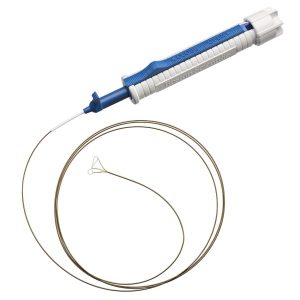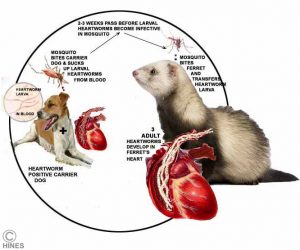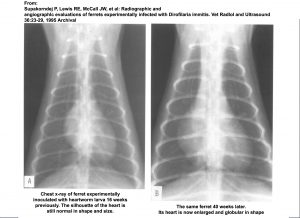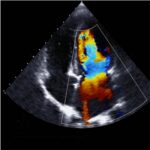Heartworms In Your Ferret – How To Prevent And Treat Them
Ron Hines DVM PhD
Heartworms (Dirofilaria immitis) are natural parasites of dogs, foxes and wolves. But Mosquitoes that transfer them are not particular in whom they bite. Many mosquitoes carry these parasite’s larva (microscopic microfilaria). When a mosquito carrying heartworm larva bites an unnatural host such as a ferret or a cat, raccoon, bear or sea lion, it can causes serious disease in them too. The heart and the blood vessel (where heartworms often mature) leading from the right chamber of your ferret’s heart to its lungs is quite small (it’spulmonary artery). So even one or two worms occupying those organs is a life-threatening situation. Mature female heartworms are larger than their male counterparts. So two mature female heartworms are large enough to restrict the flow of blood from the right side of its heart to its lungs, raising the blood pressure within the artery. That, and the chronic inflammation these worms cause, damages the vessel and the heart. The chronic inflammation of the blood vessel walls can also result in blood clots (thromboembolisms) and lung damage. Eventually all four chambers of the heart balloon and fail. In some ferrets that is a gradual process. In others, it occurs suddenly (caval syndrome). Wherever large numbers of heartworm-infected dogs reside, ferrets that are not receiving monthly heartworm preventative are in danger. That danger is directly proportional to their exposure to mosquitoes. That is why the majority of cases occur in ferrets housed outdoors. But although indoor ferrets are much less likely to catch heartworms, the risk is still there. (see here) In very rare situations, heartworm larva get lost in the body and mature in areas other than your pet’s heart.
Once a ferret is bitten by a mosquito that is carrying microscopic heartworm larva (microfilaria), the heartworm larva begin migrating, growing in size and maturing. For the first 2-3 months the majority of heartworms reside just below the skin surface (the subcutaneous tissue) and within the ferret’s muscles. They gradually migrate toward the heart, arriving there as early as 70 days after the mosquito bite. By the time four months have past, most are living in the ferret’s heart and pulmonary artery.
 What Signs Might I See If My Ferret Has Heartworms?
What Signs Might I See If My Ferret Has Heartworms?
The symptoms of heartworm infections in ferrets are not the same as in dogs. As I mentioned, because your ferret heart is smaller than most dog hearts are, it takes fewer worms to cause heart failure. And a shift in position of a single worm can suddenly reduce blood flow from its heart to its lungs.
In dogs, the first signs of heartworm disease are gradual and usually caused by chronic irritation of the lining of the heart and arteries of the lungs. So the most common first sign in dogs is a persistent cough. Ferrets react more similarly to cats when they develop heartworms. You might only notice a decrease in your pet’s appetite, weight and activity. Lethargy, weight loss and listlessness are common symptoms.
Also like cats which are also smaller, ferrets with heartworms can suddenly have difficulty breathing (dyspnea). Their gums often turn pale – grayish or bluish (cyanotic) in color – and their pulse and respiration are rapid. That is because the heartworms have blocked the flow of blood from the ferret’s heart to its lungs (the caval syndrome I mentioned earlier).
When your veterinarian listens to your pet’s chest with a stethoscope, audible heart murmurs are commonly present. The ferret’s heartbeat might be irregular and its lung sounds typical of congestion (moist rales). As time goes by, ferrets with heartworms do occasionally cough. Fluid sometimes backs up into their abdomen (ascites) and liver giving them a potbelly appearance. That could be related to general heart failure but also to a misplaced heartworm living in the main vein that drains the abdomen (its posterior/inferior vena cava). Those cases are easier to recognize than others because of the cough, have trouble breathing and their heart sounds are abnormal. Some vomit. As with an assortment of ferret diseases, ferrets with heartworms frequently loose control of their rear legs (posterior paresis). Another sign also common to many ferret health issues including heartworms is dark, tarry feces. A few run fevers.
 How Will My Veterinarian Diagnose Heartworms In My Ferret?
How Will My Veterinarian Diagnose Heartworms In My Ferret?
Besides noting the symptoms I already mentioned, your veterinarian might observe that your ferret has a weak femoral pulse, a heart murmur and/or that its pulse skips beats (arrhythmias). Your veterinarian might notice that the pet is dehydrated; they often are. When the gums are pressed, they return to their normal pink color slower than they should. (=CRT) Your veterinarian will probably check your ferret’s blood glucose level. The sudden collapse of hypoglycemia caused by an insulinoma tumor can duplicate the symptoms of sudden circulation obstruction that is common in heartworm infections. A normal blood sugar level rules that out. A normal, only slightly elevated, or subnormal body temperature rules out heatstroke. Feeling (palpating) no lumps or masses in your ferret’s abdomen and seeing none on x-rays and ultrasound exams does not eliminate lymphoma tumors with certainty. Nor does palpating a spleen of normal size. But x-rays are warranted as this point to rule out ingested non-food items and primary heart disease. A history of spending considerable time out-of-doors in an area of the world where heartworms are common brings heartworms to most veterinarian’s mind. Particularly if the ferret is receiving no monthly heartworm preventative medication. To read a typical initial workup on a ferret with heartworms ask me for Bradbury2010.pdf
 Laboratory Blood, Urine And Fluid Test Results:
Laboratory Blood, Urine And Fluid Test Results:
Early in heartworm infections a ferret’s blood analysis results are usually normal. When one or another value is elevated or low, there is no particular trend that relates to heartworm infection. However, in longer standing infections it is common for their eosinophil counts to be high. Blood eosinophil numbers tend to go up in parasitic infections and certain allergies.
Many ferrets that harbor heartworms are also become anemic (= low PCV, Hct & hemoglobin). When a ferret is in crisis due to a heartworm infection, it is common for its red blood cells to be destroyed. We do not know if that is a mechanical process or due to some released toxin(s). But in that process, hemoglobin, the red pigment in blood, is liberated. The end products of some of that free hemoglobin often finds their way into the ferret’s urine (eg bilirubinuria).
When your veterinarian suspects that fluid has accumulated around your ferrets lungs or when confirmed by x-rays, a sample of that fluid can be withdrawn with a needle and analyzed. Those tests can tell the difference between fluids leaked due to heart failure (a modified transudates) and those produced by infections such as pneumonia bacteria or virus called exudates which are higher in WBCs & protein).
 Search For Heartworm Larva In Your Ferret’s Blood
Search For Heartworm Larva In Your Ferret’s Blood
Finding heartworm larva (microfilaria), the microscopic stage carried by mosquitoes, circulating in the blood of heartworm-infected dogs confirms heartworm disease (two adult worms must be present, a male and female). But this search for larva under the microscope is considerably less helpful in ferrets. That is because at the most, they are present for only a short time. If your veterinarian is fortunate, a microfilaria might be seen in a ferret heartworm case. But that is a rare occurrence. (ref1,rptref2)
 Blood Tests That Identify The Presence of The Mature Heartworm(s) Themselves
Blood Tests That Identify The Presence of The Mature Heartworm(s) Themselves
These commercial in-office tests are very effective in identifying heartworm-infected dogs. They are useful, but somewhat less accurate in cats. They are called antigen tests because they recognize and identify protein antigens that are part of the outer layer and/or uterus of female heartworms. These tests are even less accurate in ferrets because they need a specific minimum amount of these antigens to be present in a pet’s blood stream before they can detect them. The very low heartworm burdens (numbers) found in ferrets make it problematic if there will be enough heartworm antigen present to detect. When the test gives positive results, a heartworm infection is confirmed in your ferret. But when the test comes back negative, other tests need to be performed. Male heartworms are much smaller than mature female heartworms, and so, provide less of the diagnostic antigens that these tests require. When the Snap test yields a false negative, the most accurate fallback test is echocardiography. Read about that two paragraphs down.
There is also one report that I know of that found that ferrets can become infected with a much less serious “cousin” of the heartworm that lives just under the skin whiched caused a ferrets heartworm test to be positive. When no heartworms were realy there. (ask me for Mulreany2018)
X-rays
Radiographs can be quite helpful to your veterinarian in confirming suspicions of heartworm disease. The heartworms themselves won’t be visible to your veterinarian; but the heart and perhaps surrounding blood vessel changes characteristic of heartworm disease will be. In ferrets with symptoms, the right side of their heart is enlarged due to the increased effort the heart must make to pump blood past the obstructing worm(s) and on to the lungs. On the x-rays, free fluid may be visible in the pet’s chest.
So much fluid is sometimes free in the chest that the image of the heart itself is obscured. In those cases, one must be sure that they are not dealing with a torn diaphragm subsequent to the ferret being stepped on, rather than heart disease.
 Ultrasound/ Echocardiography
Ultrasound/ Echocardiography
Doppler echocardiography is a sophisticated form of ultrasound examination that allows your veterinarian to see the heart’s pumping action and blood flow in real time. It is best performed by a specialist versed in interpreting the moving images it provides – preferably a veterinary cardiologist. Your veterinarian does not have to be a specialist in this procedure, there are remote services your local veterinarian can utilize.
The technique’s sensitivity lets your veterinarian tell the difference between dilated cardiomyopathy unrelated to heartworm and right side heart failure that is. It also allows your veterinarian to actually visualize the heartworms – definitively diagnosing the cause of that right side failure. Your vet might notice that the major blood vessels of the lungs are enlarged and convoluted (“tortuous”). He/she might note that the tricuspid valve is not closing properly (“regurgitating”).
Some large veterinary school teaching hospitals employ angiography on ferrets to visualize similar elements of the disease. It might be suggested for your ferret if surgery to extract the worms is contemplated.
 Is Their An Effective Non-surgical Treatment For Heartworms In My Ferret?
Is Their An Effective Non-surgical Treatment For Heartworms In My Ferret?
Standard treatments for heart failure might help – for a while: furosemide, a diuretic that reduces pooled fluid in the chest and abdomen sometimes allows the ferret to breath with less effort. Prednisolone, a corticosteroid, can counter some of the heart and blood vessel inflammation the worms generate and perhaps reduce the likelihood of blood clots. But the reprieve given by these drugs tend to be very short. When ferrets come in struggling breath due to heart and lung damage caused by the parasites, supplemental oxygen therapy and taping and removing chest fluid (thoracocentesis) are helpful. But these procedures only give a brief, window of improvement.
More specific medications to kill the mature heartworms are considerably more risky in ferrets than they are in heartworm-positive dogs. Veterinarians rarely detect heartworm-positive ferrets until considerable irreversible damage to the heart and lungs have occurred. So post-treatment fatalities are common.
There are “slow kill” methods of killing heartworms in dogs. The American Heartworm Society does not approve of them. They include placing pets on the antibiotic, doxycycline (to kill Wolbachiabacteria) along with moxidectin (eg Advantage Multi®) in hopes that that cocktail weakens and eventually kills the heartworms as it has been proven to do in dogs. No one knows if that treatment has positive effects in ferrets. One major problem when ferrets harbor one or more heartworms in their pulmonary artery, right atrium or vena cava is that the dead worm have no where to go but downstream where they can block passage of blood to the lungs. Their blood vessels are small which increases the chance for such a blockage.
The only approved medication to kill mature heartworms in dogs is melarsomine dihydrochloride (Immiticide®, Diroban®). It is not FDA-approved for use in ferrets. Although in one study more than half the ferrets survive the treatment, a considerable number of ferrets receiving it worsened in their heart and lung function subsequent to receiving the drug. A 2019 article describes this “extra-label” use in ferrets. (ask me for Zaffarano2019) When given that medication, ferrets need to be caged and not allowed to exercise for at least one month subsequent to these treatments. That is because dying heartworm debris have the potential to move downstream and plug vital blood channels. Veterinarians believe that strenuous exercise makes that event more likely to occur.
 Can Heartworms In My Ferret Be Removed Surgically?
Can Heartworms In My Ferret Be Removed Surgically?
Yes, but It is delicate surgery with the outcome not assured. Only a few veterinary centers are equipped to attempt it. The extraction procedure is more commonly performed on dogs that are in acute crisis due a large tangle of heartworms present in their pulmonary artery and heart. These are generally larger dogs, so the surgeons have more space to insert extraction tool down its jugular vein and into the heart: 
 How Can I Prevent My Ferret From Getting Heartworms?
How Can I Prevent My Ferret From Getting Heartworms?
So you can see why preventing heartworms in your ferret is preferable to treating the pet once it has been exposed. If you live in a high heartworm prevalence area and your ferret has the potential to be bitten by mosquitoes it is wise to keep your ferret on a monthly heartworm preventative. Although the risks are much lower, heartworm-carrying mosquitoes can and do bite indoor ferrets.
Many ferret owners purchase Heartgard® for cats or a similar ivermectin-containing product and give an appropriate portion of the tablet to their ferret every month (a portion appropriate for its current weight). If your ferret will not eat it readily, it can be wrapped or crushed in tuna or liver paste. Topical drops can also be used. At the writing, Advantage Multi® for cats for heartworm, flea and ear mite prevention is also approved for use in ferrets.



 What Signs Might I See If My Ferret Has Heartworms?
What Signs Might I See If My Ferret Has Heartworms? How Will My Veterinarian Diagnose Heartworms In My Ferret?
How Will My Veterinarian Diagnose Heartworms In My Ferret? Laboratory Blood, Urine And Fluid Test Results:
Laboratory Blood, Urine And Fluid Test Results: Search For Heartworm Larva In Your Ferret’s Blood
Search For Heartworm Larva In Your Ferret’s Blood


 Is Their An Effective Non-surgical Treatment For Heartworms In My Ferret?
Is Their An Effective Non-surgical Treatment For Heartworms In My Ferret? Can Heartworms In My Ferret Be Removed Surgically?
Can Heartworms In My Ferret Be Removed Surgically? How Can I Prevent My Ferret From Getting Heartworms?
How Can I Prevent My Ferret From Getting Heartworms? Dear reader, Besides your donations, Visiting the products that Google chooses to display on this webpage helps me pay the cost of keeping this article on the Web. As you know, sites like mine that are not designed to make money are getting harder and harder to find. Best wishes, Ron Hines
Dear reader, Besides your donations, Visiting the products that Google chooses to display on this webpage helps me pay the cost of keeping this article on the Web. As you know, sites like mine that are not designed to make money are getting harder and harder to find. Best wishes, Ron Hines